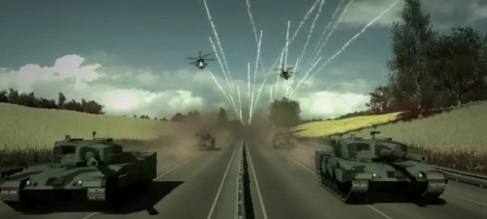Wargame: European Escalation- What You Need to Know
A spectre is haunting Europe- the spectre of good game developers that get no press for no explicable reason. Eugen is one of those studios, and their most recent title- Wargame- is quite possibly the best modern-era RTS game released in the last decade. However it has received little to no critical acclaim. The extent of its fame is essentially a few glowing articles over on Rock Paper Shotgun, including a riveting battle report of one of their own games.
I have played Wargame for over 100 hours solid now, and it shows no sign of becoming less interesting. This weekend, the game releases its second free DLC package, including more maps, a game mode, and balance tweaks. It is also going on its second massive discount for a limited time- available for 50% off, a scant $20, this weekend. At that price, it is a must-buy for any gamer who likes strategy games. And here’s why.
What Went Wrong with SupCom 2?
- Speaking for myself, Supreme Commander 2 was easily my most anticipated title of 2010. The original game and its expansion, Forged Alliance, were worthy spiritual successors to their precursor, Total Annihilation, but had room for improvement. Still, Supreme Commander showed great promise as a franchise, and I was looking forward to the direction Chris Taylor would take the series.
Suffice to say, the sequel did not live up to the hype. It is common sentiment among many of SupCom 2’s player base that, while a decent game in its own right on many points, it fails to live up to the original Supreme Commander for a variety of reasons. What I want to discuss in this post is what, specifically, went wrong, and why.
How to Design a Strategy – Part 1: Slice & Dice
It is about time this blog got down to brass tacks about strategy, This post is the first in what is probably going to be a lengthy series on what fundamental principles and thought processes are behind the development of a strategy, in any context honestly, however I will focus specifically on RTS games as an illustrative example. If you want to learn how to go from complete ignorance about any particular game into being able to formulate effective strategies to win at that game, read on.
Types of Balance
Balance is a complex subject for any game, and it is especially so in strategy games where the space of possible strategies is (typically) so large. However it is critical for any symmetric, competitive strategy game that the tools available are perfectly equal in utility. Still, balance is perhaps the most discussed, and the most badly mangled, discussion topic for any strategy game. I think we need to raise the quality of all balance discussions. In this post I am going to attempt to separate the different principles of balance, which are sadly used interchangeably in most discussions of game “balance” to the detriment of the discussion.
Warning: Wall of text inbound. Brace yerselves ‘gainst the mast o’ yer ship, me hearties!
Asymmetric Warfare
Modern strategy games are, at their core, quite simple games. I consider Starcraft and a variety of other games as fundamentally derived from the game of chess. You start the game with the same types of basic pieces, you make more pieces (added to the chess formula), and you move those pieces around the board. The ultimate objective is to checkmate your opponent by making them unable to move. However in a game where you can make more pieces the main way to do this is to eliminate your opponent’s ability to make additional pieces.
There are some philosophical underpinnings to this model that most players have seldom considered as maxims of game design. For example, the idea of “game balance” is hotly discussed for any mainstream game on every corner of the internet. While the discussions range from thought-provoking to positively inane, everyone seems to agree that the game must be “balanced.” This is the main principle behind symmetric games. However many players don’t seem to realize there is any other way you might make a game at all. Asymmetric games are rife with possibilities, almost certainly more possibilities than the entire space of symmetric wargames, begging to be explored.
